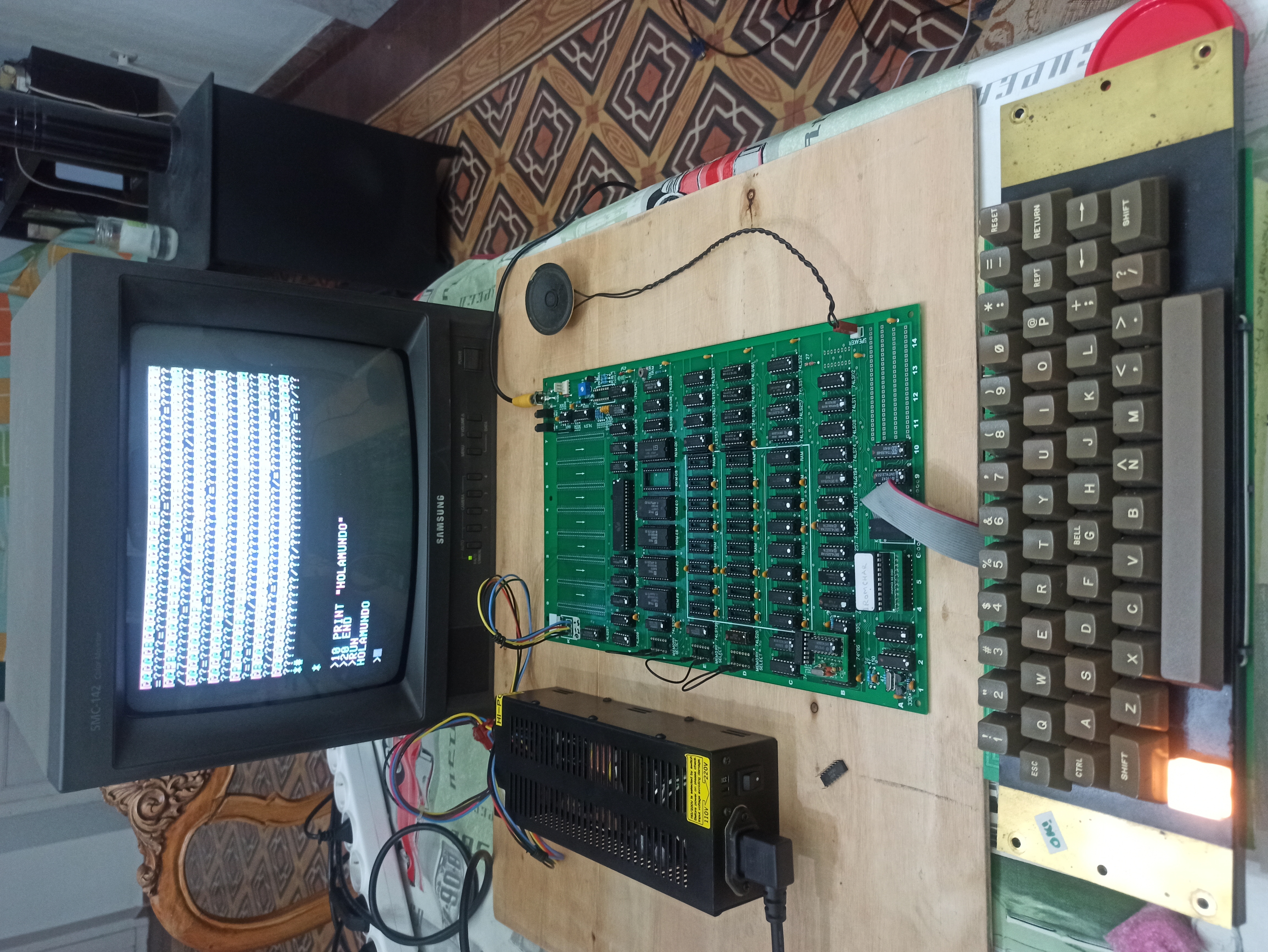(Sorry for my writing, but I use a translator)
Following the instructions of http://www.willegal.net/appleii/appleii-first_page.htm I have mounted my own Apple II Rev 0.
It would not have been possible without the help of good friends.
It is not finished yet, but it is already functional.
When I started this project I barely knew how to weld. My electronics knowledge are very low if no saying.
It has cost me a lot, I have enjoyed and at the same time suffered, I have learned a lot and I am very proud to have been able to do it. For me it has been to climb Everest.



I even recorded a video
Video of the start -up, first ignition
Video this time with original roms
Apple II Replica Tudela - 02
I present one of my friends ...He was the first (of my friends) who built an Apple II.
https://www.applefritter.com/content/let-me-introduce-myself
( Here I use a "Dead Test" rom, that another of my friends recorded me )
Apple II Replica Tudela - 05
A long time ago ... This was what I had :
Apple II Replica Tudela - 06
Testing the audio input with a wav file
https://youtube.com/shorts/9bLal2ZG0AQ?feature=shared
Link to audio file :
https://github.com/Apple-spain/AppleLogoWav
Apple Logo wav
wonderful!I was wondering what to do after apple 1.The answer is so obvious now
It looks great! I too started building a couple years ago and basically built it, my replica has life in it if you judge by the signal from pin 37 pin 6502. But there was no way I could get video so I put that project on hold. Now I think it's time to come back.
received_1210275929698428.jpeg
received_867819144344286.jpeg
May I ask what is that board in the bottom left corner? Is it something to do with the Apple II needing some specific crystal?
IMG_20240210_155716.jpg
Hi, we are a group of friends from the same city Barcelona.We built 4 Apple II, 2 worked without problems. A friend (3 under construction) did not work for the video, he checked the 3906, the crystal, dismantled them and remembered, still did not go.He decided to build an external oscillator. He solved his problem.
When I finished my montage, it gave me the same problem.Mount your PCB and the first !!! .
I look for the photos and share them.
I was sure that someone would realize the detail of the PCB;)
(Excuse me if I write weird, I use a translator)
External Oscilator by J. Gauchia - 01
This happened to me !!!
2024-02-10 13.38.27.mp4
IMG_20240208_173451.jpg
How I have an Apple II Plus working, I looked what values gave ...
The value is stable, constant. There are no rises and down.
74LS161
I don't know if what I said, it helps you. Excuse me but I have no knowledge of electronics.
The 4 - 74LS161 died, thankfully he had a replacement.
74LS161 dead
This Apple II external oscillator project has any description, maybe there is a page on GitHub? I tried 3 different crystals, but nothing changed. Perhaps this is the reason for my failure... I am from Russia, unfortunately this hobby is not very developed here...
Would you guys like to build a replica Apple-1? I'm pretty good at it, I can help with advice and I also know some reliable sellers in EU where you can buy rare components. Would you help me with my Apple II replica?
Of course I will help you in everything I can.That is the idea of this site, of this forum.
I get in touch with my friend, who created the PCB, Oscilator external and I communicate it to you.
Thanks bro, I'll be waiting to hear back. You know, an unfinished project is a pain in the ass, it makes me feel it from time to time. I use Facebook, if it will be more convenient for you, you can communicate there.
¡Buenas noches!
Hi Tulack,
That looks like a great project! Is it an NTSC or did you modify it for PAL? Does this have to do with the chrystal section being modified as well?
I notice you miss the power connector. Maybe you have them already but I stumbled upon a Dutch webshop that sell them: https://www.eijlander.nl/catalogsearch/result/?q=apple+ii. Maybe they ship to Spain as well ;-).
Take care,
Bobby
This is not an NTSC signal unable to sync on a PAL monitor?
My guess is that the Rev 0 board could be modified for PAL. I'd study the changes in the schematics in the book on the Apple II Circuits.
I am having a problem posting a direct link. You can google "W. Gayler The Apple II Circuit Description"
The Rev 0 Apple II did not have the solder pads to convert the video output to 50 Hz. So that modification would require cuts and fly wires.
The circuit description is here, it contains all details of differences between revisions:
Apple-1 doesn't seem to give a PAL signal either, does it? But it works with my monitor. So does the Apple //e, //c and //gs that I bought in the US. So I don't think my problem is PAL/NTSC. Besides then at least there would be sound, I connected the speaker from Apple //e but there is no sound. Most likely the problem is that one of the chips covered with blue tape is not what it says on it. But which one... I was able to test the other chips in my other computers and cards. I started this project after the embargo, I bought everything on aliexpress, it's full of junk.
Hi, it's NTSC.
We have not modified the video signal. We have only corrected a problem. The crystals gave us problems.
Thank you so much. I will try to order
Our intention was not to modify the NTSC signal. I have an old NTSC surveillance monitor, where I also see my Apple1 well
willegal_crystal.jpg
That's probably it, my problem is the wrong crystal. As I wrote above, I tried 3 different types of crystals that worked without problems in my Apple-1 replica, but I had no luck. So I could really use your Apple II external oscillator to move forward. I'll get the box with this project tomorrow and try to take some measurements.
Series resonant crystals are though to find these days and even when you do find them, half of the time they end up being fake or a parallel resonant crystal mislabeled with an S, which would resonate at a slightly lower frequency. One workaround is to use a parallel crystal with a trimmer capacitor in series, so you can fine-adjust the frequency, which is what we do in Europe when convertian a PAL Apple II to NTSC or a Pravetz 82 to NTSC-50:
Crystal.jpg
More on the two types of crystals here: https://www.applefritter.com/comment/101623#comment-101623
Thanks for your help, I really appreciate it! I read with great interest the topic on your link, unfortunately my level of knowledge in electronics does not allow me to modify the signal myself. I've been working as a plumber all my life, in my youth I worked as a gas welder in Siberia for a few years, which, you know, doesn't really develop my electronics skills) ). :
You're kind of good at this, aren't you? Does the Apple //e have the "right" crystal? Maybe I should borrow it for the duration of the tests? Why didn't that occur to me before. Anyway, it's time to dust off the box with this project and try to revitalize it.
There is really nothing to it. Just a super simple recipe for converting the deliberately color-handicapped Apple II Europlus to NTSC and Pravetz 82 to NTSC-50. It's been around on the Net for at least 10 years now and anyone who can unsolder and resolder a capacitor can do it.
As far as the Apple IIe is concerned - the European version already has color (PAL), so there is no need to mess with it. However the NTSC version of the Apple IIe seems to have the right crystal and the same type of oscillator as the Apple II+. Not sure about the PAL version of the Apple IIe though. Even though I have one on my desk, I cannot tell the frequency from the markings and I don't have a version of the schematics that indicate the frequency of the crystal.
I'm new to the Apple II so I may say things incorrectly. So if anyone knows I told something wrong, please correct me.If I'm not wrong Willegal was talking about a problem displaying color in NTSC, normally the screen appears in black and white but this should not be so hard to obtain.The pads on some apple II to setup PAL are because the frequency changes, but right or wrong you see something B/W on the TV whether your apple is PAL and the screen is NTSC or otherwise.The Apple II europlus that were sold in Europe included an interface to display RGB video and although they had a composite video connector, they can never display color through that output (not in PAL mode).In our teamwork there were several people with different crystal troubles.First of all, we have the rev 0 without NTSC switching pad and (usually) European TV screens, getting video was easy, but getting color video was not.Them after, at least one colleague had general clock problems and its computer never worked. He was the one who designed the little hat card with an external clock.Once he did it he got color video even with the less accurate crystals, so the problem may not be with them but with the rest of the associated circuitry.But otherwise, he simply may have a better TV to try, and so he have composite color and not me. Of course I talk about NTSC color.
As part of another investigation I developed a method to test how close the frequency needs to be to 14.31818 MHz in order to show color in NTSC. Here are the results for various TVs that I own, perhaps it could be of some help:
46" LCD Sony Bravia KDL-46XBR4: ....... 14.314473 - 14.321391 MHz
14" CRT Sony Trinitron KV-14T1R: ........ 14.316686 - 14.319890 MHz
14" CRT JVC C-F14EE: ......................... 14.314677 - 14.320577 MHz
4" LCD car monitor from AliExpress: .... 14.312184 - 14.325282 MHz
One conclusion that can be made right away is that some TVs are more forgiving than others.
The frequency is displayed on the screen and the program allows me to increase and decrease it in real time and see when the color goes away or comes back. Here is a video of one of the tests.: https://www.youtube.com/watch?v=2mGQUJhtTKg